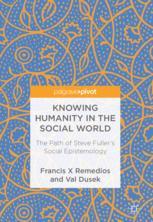

Most ebook files are in PDF format, so you can easily read them using various software such as Foxit Reader or directly on the Google Chrome browser.
Some ebook files are released by publishers in other formats such as .awz, .mobi, .epub, .fb2, etc. You may need to install specific software to read these formats on mobile/PC, such as Calibre.
Please read the tutorial at this link: https://ebookbell.com/faq
We offer FREE conversion to the popular formats you request; however, this may take some time. Therefore, right after payment, please email us, and we will try to provide the service as quickly as possible.
For some exceptional file formats or broken links (if any), please refrain from opening any disputes. Instead, email us first, and we will try to assist within a maximum of 6 hours.
EbookBell Team

4.7
96 reviewsThis book examines Fuller’s pioneering vision of social epistemology. It focuses specifically on his work post-2000, which is founded in the changing conception of humanity and project into a ‘post-‘ or ‘trans-‘ human future. Chapters treat especially Fuller’s provocative response to the changing boundary conditions of the knower due to anticipated changes in humanity coming from the nanosciences, neuroscience, synthetic biology and computer technology and end on an interview with Fuller himself.
While Fuller’s turn in this direction has invited at least as much criticism as his earlier work, to him the result is an extended sense of the knower, or ‘humanity 2.0’, which Fuller himself identifies with transhumanism. The authors assess Fuller’s work on the following issues: Science and Technology Studies (STS), the university and intellectual life, neo-liberal political economy, intelligent design, Cosmism, Gnosticism, agent-oriented epistemology, proactionary vs precautionary principles and Welfare State 2.0.